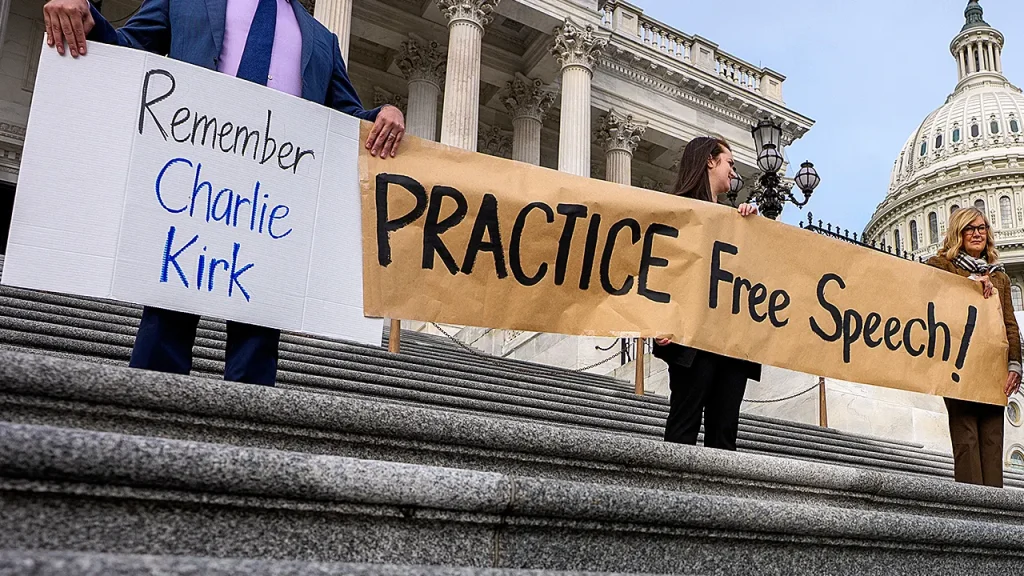Listen to the article
Young Conservatives Champion Free Speech at Law Schools Amid Growing Campus Tensions
The Federalist Society’s National Lawyers Convention begins this week in Washington, D.C., focusing on “New Frontiers” – a theme encompassing technological advancements, artificial intelligence, and the rising generation of conservative legal minds. At its core, the convention aims to highlight the importance of open debate and free speech across political divides during a period of increasing campus tensions.
Law students heading Federalist Society chapters from prestigious universities nationwide will gather to discuss challenges they face in promoting viewpoint diversity. These students report varying degrees of resistance to conservative perspectives on their campuses, from subtle ostracism to more overt forms of intimidation.
“We’re entering a new legal frontier,” said Jordan Holmes, who leads the University of Texas at Austin’s Federalist Society chapter. “From AI to the courts, everything’s changing. But if people stop talking to each other, that’s when violence starts. We can’t let that happen.”
The convention comes amid heightened concerns about campus speech restrictions. Just last month, New York University Law School administrators initially attempted to cancel a speaking event featuring pro-Israel legal scholar Ilya Shapiro, scheduled for October 7. Administrators had suggested postponing the event, citing potential protests and security concerns. Federalist Society chapter members pushed back, arguing that rescheduling would amount to “giving in to the heckler’s veto.” Following public backlash, the administration ultimately allowed the event to proceed as planned.
Matthew Holmes, president of the University of Michigan School of Law’s Federalist Society chapter, described a more subtle form of intimidation: students taking notes on who attended their events. “There are groups that tell their members, ‘If you go there, you’re not welcome at ours,'” Holmes added, highlighting the social pressure often applied to those engaging with conservative viewpoints.
The assassination of conservative commentator Charlie Kirk at Utah Valley University in September has cast a shadow over campus political activities nationwide. Kirk’s killing while speaking at a university event sent shockwaves across academic institutions, with many conservative student leaders expressing concerns about their own safety.
“I think that’s something that struck us all deeply,” said David Huang, who leads Yale’s Federalist Society chapter. “The threat of political violence – especially against conservatives in law school and college campuses – it’s something that’s very troubling to have in the back of your mind.”
Despite these concerns, Huang noted that his chapter’s event on birthright citizenship – held just one day after Kirk’s death – drew record attendance. “It was one of our most controversial events of the semester,” he explained. “I was worried. I asked for more security, but things went well, and we actually had the highest attendance we’ve had in years.”
This reflects what several chapter presidents described as a growing recognition of the importance of structured debate over silencing opposing viewpoints. Holmes referenced one of Kirk’s quotes: “When people stop talking, that’s when violence starts.” He criticized the perspective that “attendance equals endorsement” of controversial ideas, arguing that engagement with opposing viewpoints is essential for democratic discourse.
“This idea that I can’t even talk to you because your ideas are so repulsive – that just can’t last if we’re going to have a democratic republic,” Holmes said.
Despite facing challenges, the student leaders expressed optimism about the future of campus discourse. They pointed to initiatives like new civil discourse funding at the University of Michigan aimed at bringing together students from across the ideological spectrum.
The convention will feature student-led events where chapter presidents interview judges about their interests outside the courtroom, humanizing judicial figures beyond their professional roles. The goal, according to organizers, is to remind attendees that beneath the formalities of legal proceedings are people with diverse backgrounds and perspectives.
“Come to the events, have your ideas challenged,” Holmes encouraged. “Feel free to push back. We really want to scrutinize ideas. Because when we do that, that’s when we draw the best conclusions.”
Fact Checker
Verify the accuracy of this article using The Disinformation Commission analysis and real-time sources.




8 Comments
Campus ‘cancel culture’ is a concerning trend that threatens the free exchange of ideas. I’m glad to see law students organizing to counter this and uphold the principles of free speech. Constructive dialogue is the path forward.
It’s promising to see the next generation of legal minds taking a stand for free speech. Maintaining a marketplace of ideas, even for unpopular views, is vital. I wish these students success in their endeavor.
Kudos to these law students for mobilizing to defend free expression on campus. Viewpoint diversity should be celebrated, not silenced. Robust debate is the foundation of a thriving academic environment.
Promoting open debate and intellectual diversity is a worthy goal for these law students. Healthy disagreement is essential for progress. Hopefully their efforts can serve as a model for universities nationwide.
Viewpoint diversity is crucial in academia. While some may find certain perspectives uncomfortable, stifling discourse only breeds more division. These students seem to understand the importance of civil, open debate.
Interesting to see law students taking a stand for free speech on campus. It’s important to maintain open and respectful dialogue, even for views that challenge the status quo. Diversity of thought is vital for a healthy society.
It’s concerning to see the rise of ‘cancel culture’ on college campuses. These law students are right to push back and defend the principles of free speech and open discourse. Their efforts deserve recognition.
Maintaining viewpoint diversity in academia is crucial. While some ideas may be uncomfortable, suppressing them only breeds more division. I commend these law students for their principled stance in support of free expression.